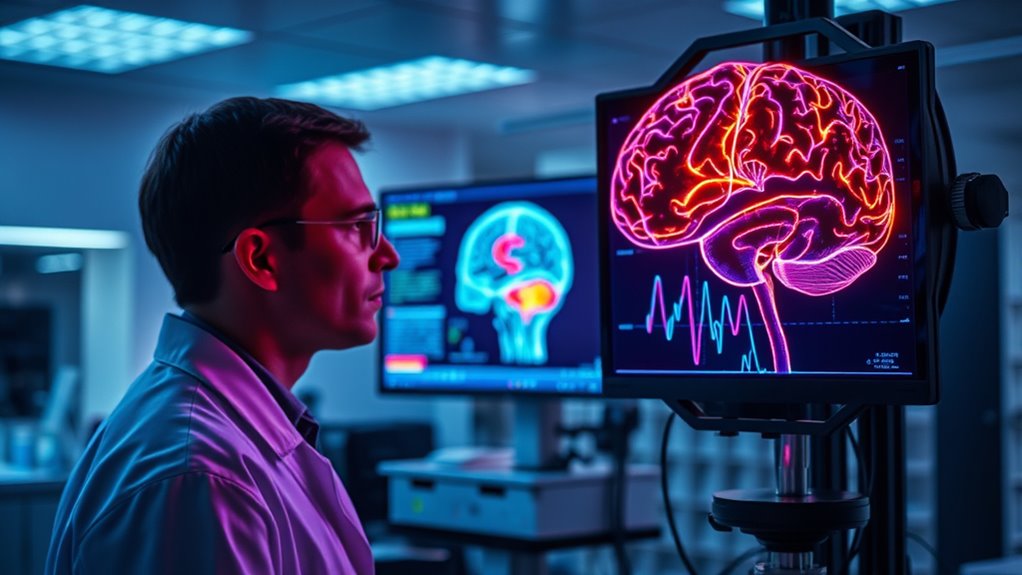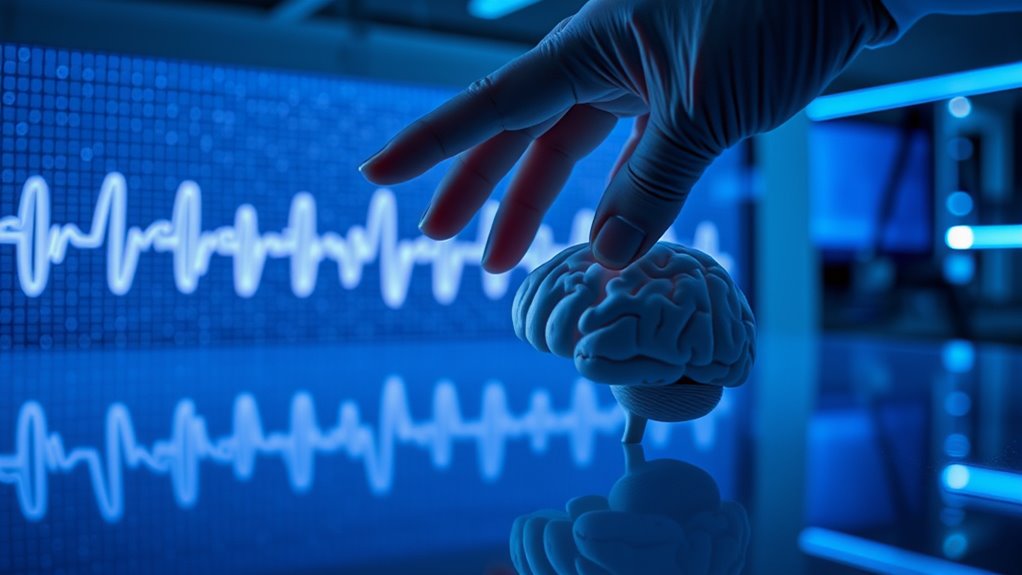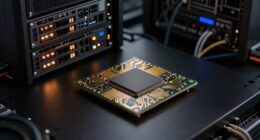Brain studies show that your decisions actually form unconsciously seconds before you become aware of them. Neural activity in your brain initiates choices before your conscious mind notices, challenging the idea that you have full free will. While it may seem like you’re making free choices, these findings suggest your brain influences your actions without your awareness. If you’re curious about what this means for personal control, keep exploring the fascinating insights behind these discoveries.
Key Takeaways
- Neural activity indicating decisions occurs seconds before individuals become consciously aware of choosing.
- Brain studies suggest unconscious processes initiate decisions, challenging traditional notions of free will.
- Conscious awareness may be a post-hoc rationalization, implying free will could be an illusion.
- Variability in neural responses influences decision formation, highlighting unconscious influences on choices.
- These findings prompt reevaluation of free will, personal agency, and moral responsibility in light of unconscious decision-making.

The debate over free will has gained new momentum thanks to recent brain studies that challenge traditional notions of personal agency. These studies suggest that our brains make decisions before we’re consciously aware of them, sparking intense discussions within the neuroscience debate and raising profound philosophical implications. You might have always believed that you consciously choose your actions, but new evidence indicates that your brain’s neural activity predicts your decisions seconds before you become aware of making them. This realization forces you to reconsider what free will truly means and whether it exists at all.
Recent brain studies challenge the idea of free will by predicting decisions before conscious awareness.
Neuroscientists have used brain imaging techniques to monitor neural activity during decision-making processes. They’ve found that specific patterns of activity appear in the brain well before you report being conscious of your choice. For example, in experiments where participants decide which button to press, brain signals indicating the decision can be detected up to several seconds before the person reports awareness of making that choice. This suggests that your brain is initiating decisions unconsciously, and your conscious mind simply becomes aware of the outcome afterward. Such findings are at the heart of the neuroscience debate, emphasizing that free will may be an illusion created by your brain’s complex processes. Additionally, the role of brain activity in shaping decisions highlights the importance of understanding neural mechanisms behind choices. Moreover, the variability in individual neural responses indicates that personal factors can influence how decisions are formed even before conscious recognition occurs. Recognizing these unconscious influences can also inform approaches to decision-making and improve cognitive interventions.
These discoveries have significant philosophical implications. If your brain is deciding before you’re aware of it, then your sense of agency might be more about post-hoc rationalization than actual control. You could be thinking, “I chose this,” when in reality, your subconscious brain made the decision first. This challenges traditional views of moral responsibility and personal accountability, prompting questions about whether you should be held responsible for actions predetermined by brain activity. Some philosophers argue that free will is compatible with this new understanding, proposing that conscious awareness is just one aspect of decision-making. Others contend that if decisions are made unconsciously, the very concept of free will needs reevaluation.
Furthermore, these studies fuel ongoing debates about determinism versus free choice. If your brain’s activity determines your actions before you’re aware of them, it suggests that your choices are shaped by factors outside your conscious control—such as genetics, environment, and neural wiring. Yet, some argue that awareness of these processes doesn’t negate responsibility but rather deepens the understanding of human behavior. You might not have free will in the traditional sense, but you still have the capacity to influence and understand your decision-making processes. The recognition of these unconscious influences opens new avenues for neuroscience research aimed at exploring how to enhance human decision-making and moral responsibility.
In the end, these brain studies challenge you to rethink personal agency, morality, and the nature of decision-making itself. Whether they diminish your sense of free will or simply reshape it, they undeniably push you to explore new philosophical horizons about what it means to be truly autonomous.
Frequently Asked Questions
How Do These Findings Impact Legal Responsibility?
These findings on neural determinism suggest your decisions are shaped before you’re even aware, impacting how you see moral responsibility. If your choices are determined by brain activity beyond your control, it challenges traditional views on accountability. Legally, this raises questions about whether you should be held fully responsible for actions influenced by unconscious neural processes, potentially leading to shifts in how responsibility and culpability are judged in the justice system.
Can Free Will Exist Without Conscious Awareness?
You might wonder if free will can exist without conscious awareness. Subconscious influence plays a big role here, suggesting your decisions could be shaped before you’re even aware. This fuels the free will debate, making you question whether true independence exists or if your choices are predetermined by underlying brain processes. So, it’s possible that free will, as you understand it, might be limited by subconscious activity.
Do These Studies Apply to Complex Decision-Making?
Imagine you’re at a Renaissance fair, pondering a complex choice. Neuroscience limits suggest that even with decision complexity, your brain forms decisions before you’re aware, meaning subconscious processes influence your actions. These studies do apply, but they show that the more intricate the decision, the more your brain relies on automatic, pre-conscious mechanisms. So, your free will might be more limited in complex scenarios than you’d like to think.
How Reliable Are Brain Scans in Predicting Choices?
Brain scans show promising predictive accuracy regarding your choices, but they aren’t foolproof. Neural determinism suggests your decisions are influenced by brain activity patterns even before you’re aware of them. While these scans can forecast some decisions, their reliability varies, especially with complex choices. So, don’t fully rely on neural determinism—your awareness and context still play vital roles in decision-making.
What Are the Implications for Moral Accountability?
Think of your choices as seeds planted deep in your mind before you even realize it. This raises tough questions about moral dilemmas and their ethical implications. If decisions form before awareness, it challenges your sense of moral accountability. You might feel like a passenger rather than the driver of your actions, which could reshape how society assigns responsibility and justice. It’s a complex web that makes you question what it truly means to be accountable.
Conclusion
So, as the saying goes, “The mind is a terrible thing to waste.” This study suggests your brain decides before you’re even aware, making free will seem like an illusion. While it might feel like you’re in control, your choices could be shaped long before you realize it. Remember, understanding your brain’s workings helps you see that thoughts and decisions are more complex than they appear—like a puppet with invisible strings, pulling your actions behind the scenes.









